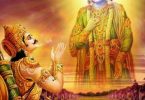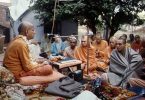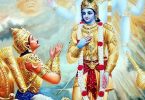Question 1: It is said that Krishna can award liberation, but He confers love of God only to those who are really sincere. What is the difference?
Answer by Romapada Swami: In general people consider the goal of religiousness to be economic development, satisfying material necessities and ultimately gaining liberation (dharma artha kama moksha). By liberation we mean ending the repeated cycles of birth and death and absolving all actions and reactions of material life. But Lord Caitanya taught that the ultimate goal of life reaches far beyond this neutral sense of moksha; life’s ultimate goal is to develop unalloyed love of God. This very message, and how this is achieved is the essence of Srimad Bhagavatam.
The happiness derived from this pure love of God far surpasses the happiness derived even from liberation (c.f. Nectar of Devotion, Ch. 1). It is said that all the happiness of this material world and that of liberation are awaiting at the doorstep of a pure devotee, but the devotee is so absorbed in relishing their service to Krishna that they do not care so much for liberation, nor do they care whether they are in hell or heaven, as long as they can serve Krishna.
For example, the residents of Vrindavana or the Pandavas were simply interested in loving Krishna and pleasing Him; they did not care for their own spiritual advancement or wellbeing. Yet by their love the Supreme Lord became completely controlled by them, so much so that He took a subordinate position to His devotees. This goes far beyond the conception of a person trying to gain liberation from material clutches. Of course, one so engaged in the Lord’s service is very dear to Him, and thus automatically becomes eligible for liberation from material miseries.
Even the enemies of Krishna who were personally killed by Him attained liberation. But pure devotion is very rare to achieve because by devotional service the Lord becomes purchased by the devotee.
Question 2. I read somewhere that those who achieve Sarupya, Salokya, Sarsti and Samipya mukti are not born again, and are eternal. For each of these, please give examples of persons who have achieved this liberation. Why is it that they do not reach Krishna’s abode in Goloka Vrindavana? I was under the impression that the ultimate goal for each soul is to reach Krishna’s abode.
Answer by Romapada Swami: Sarupya mukti is to attain the same form as the Lord; the residents of Vaikuntha planets all have a four-handed forms and features resembling the four-handed Lord Narayana. Salokya mukti is to attain the same planet of the Lord, Sarsti is to have similar opulences as the Lord and samipya is to gain His personal association. Generally these liberations refer to achieving a position in the Vaikuntha planets, but one can also reside in Goloka, as well manifest opulences given by Krishna to assist Him in His service in some way, etc. Thus a devotee may attain any one of the Vaikuntha planets or Goloka Vrindavana according to his mood of devotion to the particular form of the Personality of Godhead.
As far as the ultimate goal of the soul is concerned, the ultimate goal is to achieve pure love of Godhead (as discussed in the question above) and to be engaged in devotional service to Krishna. That is the constitutional position of the soul – to serve Krishna. This may mean to actually be transferred to the spiritual planets, or attain one of the above four kinds of liberation, but not necessarily. Since devotional service is absolute, it is non-different from Krishna’s abode. Anyone who is engaged in devotional service in full Krishna consciousness, even while in the material realm, is actually situated in the spiritual world.







